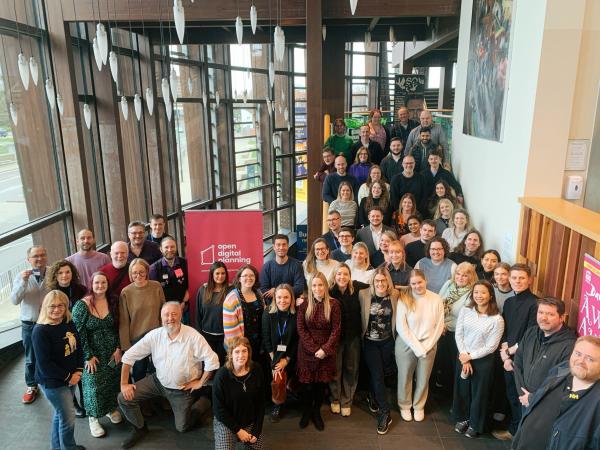What we do
We are a diverse community, with some Local Planning Authorities focused on enhancing their digital planning capabilities and improving and publishing their datasets on the Planning Data Platform. Others work with developers and designers to create products that improve access to essential planning data, enabling seamless information flow and automating routine processes to meet user needs, ensure security and promote transparency.
Future legislation seeks to encourage this move to more modular technology.
“It's so different as a planner to go from being asked 'does this work?' to 'what do you actually want out of this software?'”
Janine, Planning Business Support Officer, Dacorum Borough Council
How we work
The Open Digital Planning community is made up of council officers, content writers, developers and user researchers from over 100 Local Planning Authorities, digital agencies and central government.
When Local Planning Authorities join the community, they begin a digital planning improvement journey. They follow a five-step process, which includes:
- Accessing detailed guidance and a peer support network
- Completing a Digital Planning Maturity Assessment
- Creating an action plan to boost their digital skills
- Taking part in digital and data training linked to their action plan
- Improving and sharing their first four spatial datasets on the Planning Data Platform: Conservation Areas, Listed Buildings, Tree Preservation Orders, and Article 4 Directions.
By joining the ODP community, Local Planning Authorities can also move into the Open Digital Planning product space, where tools like PlanX, BOPS, or Digital Planning Register may suit their organisation’s needs.
In the product space, we work in small product teams that take part in research, design and testing activities. Using the collective wisdom of council officers, with a deep knowledge of local planning, we can make our products better and meet the needs of council planning teams. Depending on their level of involvement councils may also prioritise the features that are built and help direct the overall strategy for Open Digital Planning.
Council officers are also responsible for the day-to-day running of the services in their local authorities.
Design and development support is provided by: Open Systems Lab, Nomensa, TPXimpact and Unboxed.
A dedicated team of delivery managers from the Ministry of Housing, Communities, and Local Government provide guidance and coordination.
“What I appreciate the most is our collaboration across disciplines. The diverse range of expertise within the ODP community not only fuels innovation, but also ensures that our solutions truly match up with the needs of planning teams.”
Stephen Barnes, Senior Planner (Digital Projects), Lambeth Council
What we mean by 'Open' Digital Planning
Open source
The source code underpinning our work is open by default. The code is freely available to software developers to reuse and edit. Where features in our products are of interest to others, reusing our code can save effort and support the improvement of services across the planning software market.
Working in the open
We make our documents, presentations, and research publicly viewable so that others can benefit from our findings. Our monthly Show-and-Tells are open to all and allow us to share our progress with a wider audience.
Open standards
We want to see a plug-and-play ecosystem of digital planning services that 'just work'. Integrations between different systems should be straightforward, and based on openly published standards and documentation, so that councils have more choice in the software they use.
Working collaboratively
All ODP partners are committed to the five principles of the Local Digital Declaration, an ambition for the future of local government services.
We believe councils should be at the heart of how local services are designed. By collaborating to address common challenges, we support one another and share valuable insights along the way. Our products are designed with more than just our community in mind. By bringing in multiple viewpoints we are creating services that work for everyone.
Want to know more?
To speak with a member of the Open Digital Planning programme team, please get in touch.
